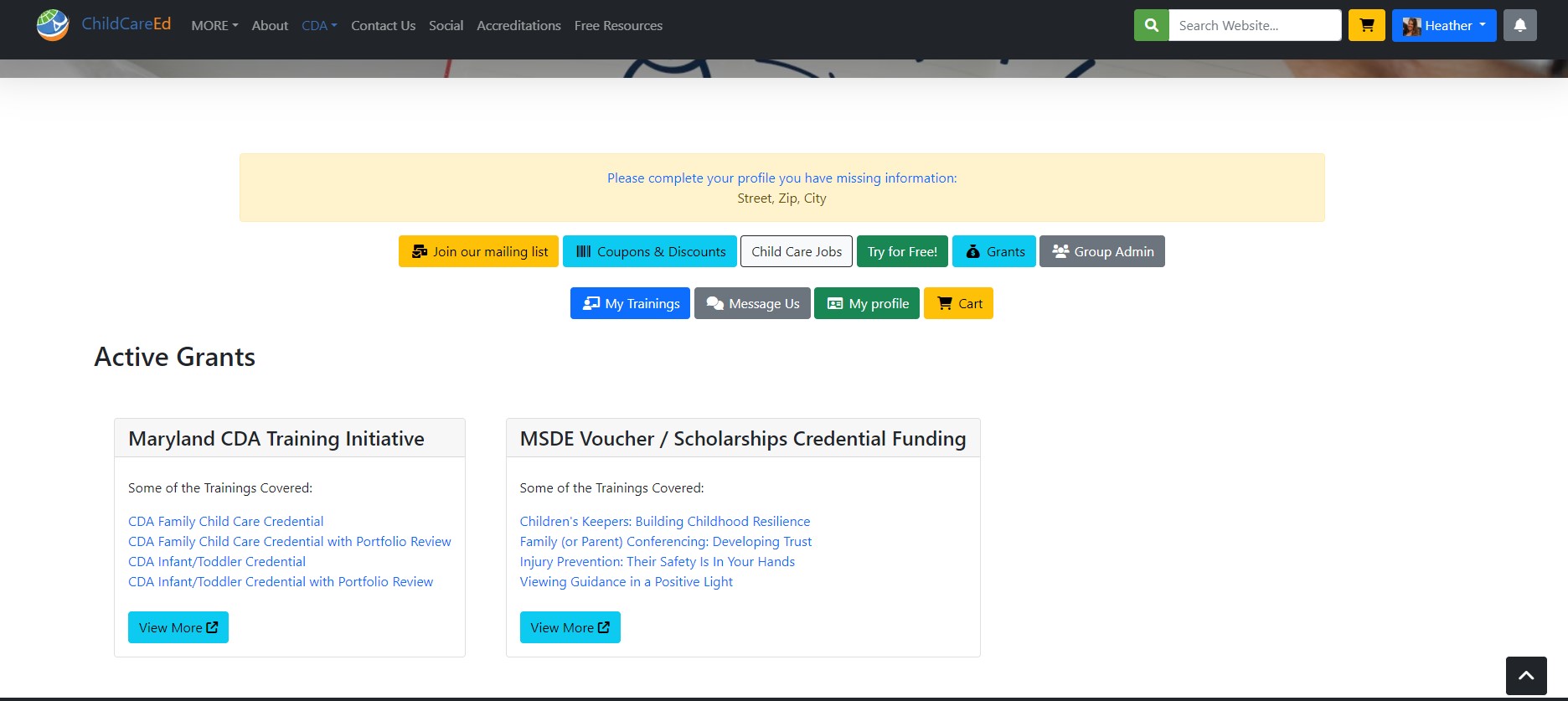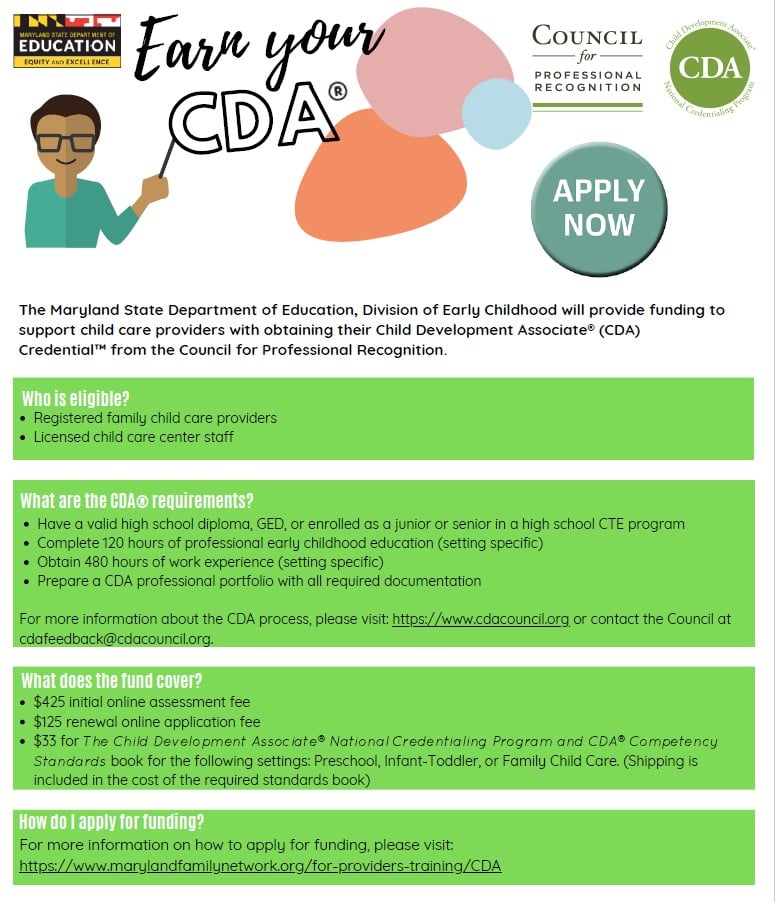How to get a CDA for free
ChildCareEd is a valuable resource for individuals aspiring to complete their Child Development Associates (CDA) in the field of early childhood education. However, pursuing a CDA can be a costly endeavor. In this article, we will explore how to get a CDA for #free or at a reduced cost through grant opportunities and local funding sources. We'll also touch on ChildCareEd's subscription-based model, which, while not entirely free, offers a one-time fee option for access to their resources.
State-Specific Listings: One of the most notable features of the CDA Scholarships Page is its state-specific scholarship listings. By selecting their state of residence, students can instantly access information on scholarships available in their region. This ensures that scholarship seekers can find opportunities that are most relevant to them.
Links to More Information: The CDA Scholarships Page goes beyond just listing scholarships. It provides links to additional information about each scholarship, allowing students to delve deeper into the application requirements, deadlines, eligibility criteria, and more. This comprehensive approach empowers students to make informed decisions about which scholarships to pursue.

ChildCareEd Grant Availability
ChildCareEd understands the financial burden of pursuing a CDA and has compiled a list of potential grant opportunities to help individuals offset these costs. ChildCareEd directs users to information on available grants. This is a great starting point for those seeking financial assistance for their CDA journey.

Local Grants and Funding Sources
Maryland CDA Training Initiative
The Maryland CDA Training Initiative is a testament to the collective efforts of MFN, MSDE, and the CDA Council in breaking down the financial barriers that often hinder individuals from pursuing a CDA credential. This program includes:
CDA Credential: The CDA credential is a nationally recognized certification that demonstrates an individual's competence and knowledge in the field of early childhood education. It is highly sought after in the industry and opens doors to a range of career opportunities.
CDA Renewal: Continuous professional development is key in the field of early childhood education. The CDA Renewal component of the bundle ensures that educators can stay up-to-date with the latest practices and maintain their credentials.
CDA Bridge: For individuals with prior early childhood education qualifications, the CDA Bridge provides a streamlined path to earning the CDA credential.
One of the most remarkable aspects of the Maryland CDA Training Initiative is that it covers not only the training costs but also the application fees and materials required for the CDA journey. This removes the financial burden that often dissuades individuals from pursuing this valuable credential.
TTT ECE Apprenticeship program
The TTT ECE Apprenticeship Program is a shining example of an initiative dedicated to nurturing and developing the next generation of early childhood educators. With a focus on apprenticeship-style learning, this program provides hands-on training and educational support, ensuring that educators are equipped with the skills and knowledge needed to excel in their roles.
The Maryland Rebuilds Grant has emerged as a catalyst for change in the field of early childhood education. It recognizes the importance of investing in quality education for young children and aims to remove the financial barriers that often deter individuals from pursuing a CDA credential.
ChildCareEd is proud to partner with the TTT ECE Apprenticeship Program to provide the 120-clock hour course work for CDA Credential. Free CDA coursework!
While not entirely free, ChildCareEd offers a subscription-based model for users to save money and complete required training. This single-time fee option allows users to access a wealth of CDA-related materials, coursework, and support. While this might not be a free option, it can be a cost-effective investment in your CDA journey.
Pursuing a CDA is a significant step towards a rewarding career in early childhood education. ChildCareEd recognizes the importance of making this education accessible and affordable. By exploring grant opportunities, and local funding sources like the Maryland CDA Training Initiative and TTT ECE Apprenticeship program, you can potentially reduce or even eliminate the financial barrier to obtaining a CDA. ChildCareEd's subscription-based access offers a cost-effective way to access high-quality resources and support as you work towards your CDA credential. With these options in mind, aspiring #early-childhood-educators can take confident steps toward achieving their career goals.
Obtaining a Child Development Associate (CDA) credential for free may be possible through various grants, scholarships, and programs designed to support early childhood educators. Here are steps you can take to explore free CDA options:
-
Research Grants and Scholarships:
- Start by researching grants and scholarships specific to early childhood education and CDA certification. Look for both local and national opportunities.
- Consider contacting organizations, non-profits, and government agencies in your area that might offer financial support for CDA training and coursework.
-
Check with Local Agencies:
- Contact your state or local Department of Education or Department of Human Services to inquire about any available grants or programs that cover the cost of CDA training.
- Reach out to local childcare associations and advocacy groups for information on grants or scholarships for aspiring early childhood educators.
-
Explore Apprenticeship Programs:
- Look for apprenticeship programs in your region that provide training and support for CDA certification. Some of these programs may offer free coursework and materials.
- Check if any organizations or employers in your area sponsor apprenticeships or provide financial assistance for CDA candidates.
-
Visit the CDA Council Website:
- The CDA Council's website has information on grants or scholarships available for CDA candidates. Explore their resources and contact them for guidance.
-
Contact Educational Institutions:
- Reach out to local colleges, universities, and vocational schools to inquire about scholarships or financial aid options for CDA coursework.
- Some institutions may offer free or reduced-cost CDA training as part of their education programs.
-
Network and Seek Recommendations:
- Connect with experienced educators in your field or join online forums and communities dedicated to early childhood education.
- Seek recommendations and insights from others who may have successfully obtained their CDA for free or at a reduced cost.
-
Utilize Online Resources at ChildCareEd:
- ChildCareEd is dedicated to early childhood education and professional development. They offer free CDA resources, such as guidelines for completing the professional portfolio.
-
Apply for Financial Aid:
- If you choose to pursue CDA coursework through an accredited institution, consider applying for federal financial aid programs such as the Free Application for Federal Student Aid (FAFSA). Some programs may qualify for financial assistance.
-
Consider Employer Support:
- If you are currently employed in a childcare facility, inquire with your employer about any support they may offer for CDA certification. Some employers provide financial assistance or reimbursement for employees seeking CDA credentials.
-
Stay Informed:
- Keep an eye on early childhood education-related news and announcements, as new funding opportunities and grants may become available periodically.
Remember that the availability of free CDA opportunities can vary by location and the specific programs and grants available in your area. Be proactive in your search, and don't hesitate to reach out to organizations and institutions that can provide guidance and information on how to obtain your CDA credential for free or at a reduced cost.
- CDA Bridge Bundle: Family Child Care
- CDA Bridge Bundle: Family Child Care without Portfolio Review
- CDA Bridge Bundle: Infant/Toddler without Portfolio Review
- CDA Bridge Bundle: Preschool
- 45 Hour Preschool Methods and Materials
- CDA Bridge Bundle: Preschool without Portfolio Review
- CDA Bridge Bundle: Infant/Toddler
- CDA Family Child Care Credential
- Texas Director Credential
- Get Your CDA for Only $99!
- Child Development Associate (CDA) Fund for Maryland
- How to get a CDA for free
- Want to Work in Childcare? This Free Certification Could Be Your Golden Ticket!
- How to Get a Free Early Childhood Education Training
- Free Online Childcare Training With Certificates Texas
- Free Online Childcare Training With Certificates Nevada
- What Is A CDA Certification?